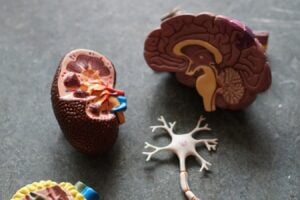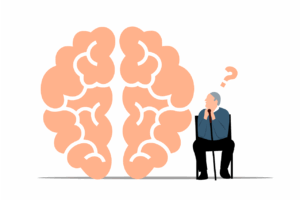CAN YOU DIAGNOSE YOURSELF? An important study suggests that self-reported memory complaints might predict clinical memory impairment later in life.
Erin Abner, an assistant professor at University of Kentucky Sanders- Brown Center on Aging, asked 3,701 men aged 60 and higher a simple question: “Have you noticed any change in your memory since you last came in?”
That question led to some interesting results. “It seems that subjective memory complaint can be predictive of clinical memory impairment,” Abner said. “Other epidemiologists have seen similar results, which is encouraging, since it means we might really be on to something.”
The results are meaningful because it might help identify people who are at risk of developing Alzheimer’s Disease sooner. “If the memory and thinking lapses people notice themselves could be early markers of risk for Alzheimer’s disease, we might eventually be able to intervene earlier in the aging process to postpone and/or reduce the effects of cognitive memory impairment.”
Abner, who is also a member of the faculty in the UK Department of Epidemiology, took pains to emphasize that her work shouldn’t necessarily worry everyone who’s ever forgotten where they left their keys.
“I don’t want to alarm people,” she said. “It’s important to distinguish between normal memory lapses and significant memory problems, which usually change over time and affect multiple aspects of daily life.”
Related Videos & Articles:
MORE INFORMATION:
The Sanders-Brown Center on Aging at the University of Kentucky is nationally recognized for its research, education and outreach, and clinical programs on healthy brain aging and neurodegenerative disorders. In 1985, the SBCoA was named as an Alzheimer’s Disease Center, one of the original ten centers funded by the National Institute on Aging.
Source:
University of Kentucky












Wow, someone who gets it! Thank you for your posting.
My wife died with Alzheimer's disease and the fact that it was incurable and progressive was a difficult but necessary thing to face.
It was also "not nice" (hurtful?) when well wishers would try to tell us about the latest 'cure' that they had seen on TV. Fact: there is no cure for Alzheimer's disease.
BUT they best most underappreciated piece of advice (that we only saw once in an informational brochure) was that if/when you are diagnosed dont go to a doctor looking for a cure, instead rush to a lawyer to prepare for the inevitable.
When she got worse and eventually died, I was SOOOOoooo happy that all the papers were in order. THAT really made things easier.
I facilitate Alzheimer's support groups and have my own concerns with changes in my brain. I know how the testing occurs and do not believe I would be diagnosed as having Alzheimer's, but I would give myself the "mild cognitive impairment" diagnosis. Of course I am concerned, and continue to do aerobic exercise daily (sometimes 2-3x a day). My diet is excellent, and I am learning to play Ukulele, and have a voracious desire to read for relaxation, and collect info from the internet. I am writing, because doing all of the above , which I enjoy, will not prevent Alzheimer's. The primary reason to encourage earlier diagnosis is that you want to MAKE SURE your advance directives are kept up to date!! Oh you might start on some Aricept, but they really don't want to start that too soon.
I wish I could say there is a way to prevent Alzheimer's, but I have watched others who were doing all of the above, and their quality of life is better (more energy, less obesity, less cardiac problems, etc) but it won't prevent it!!